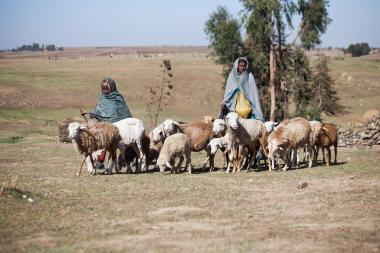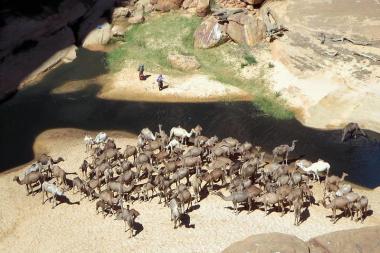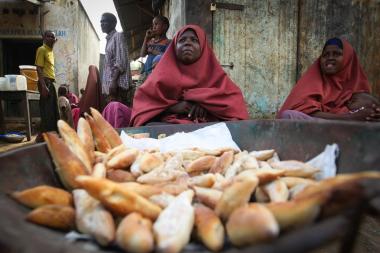Side event
SPARC at COP28
SPARC researchers led conversations on topics related to climate action in the drylands of Africa and the Middle East, home to some of the world's most climate-vulnerable people.
Event date and time 12:00am +04
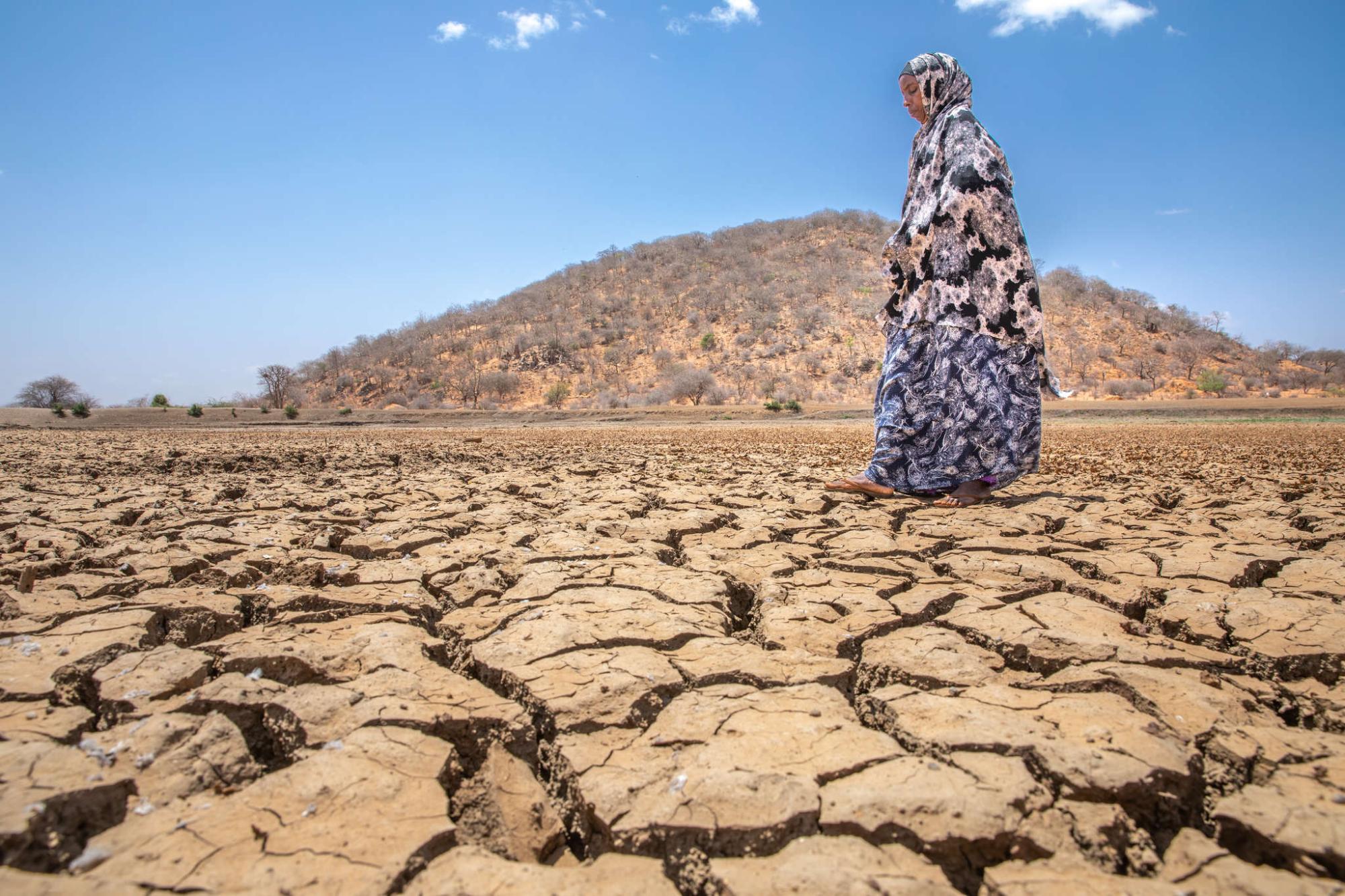
For years SPARC has been working at the intersection of climate change and conflict, and at COP28 the programme was involved in a number of high-level events to move forward the conversation on scaling up climate finance and action in fragile and conflict-affected areas.
- SPARC moderated the first official UNFCCC side event to focus on climate action in conflict-affected countries (‘Strengthening Climate Action in Countries Affected by Protracted Crises’, 1 December). The event was organised with the Government of Somalia, ICRC, Islamic Development Bank, ODI and UNHCR and featured as speakers the Deputy Prime Minister of Somalia Salah Jama, Iraq Minister of Water Resources Aoun Diab, Director of ICRC Robert Mardini, Vice President of the Islamic Development Bank Zamer Iqbal, Norwegian climate envoy Hans Olav Ibrekk, and Sudanese-American slam poet and UNHCR ambassador Emtithal Mahmoud.
- SPARC moderated an event at the UK Pavilion (‘Towards Climate-resilient Development in the Greater Horn of Africa’, 3 December) which announced Somalia’s accession to the UK Task Force on Access to Climate Finance – a process which SPARC was involved in. The event also saw the launch of the new SPARC-funded publication ‘Building Forward Better: a pathway to climate-resilient development in fragile and conflict-affected situations’, which will frame SPARC’s work on this issue over the next year. The event speakers included Ministers from Somalia, the UAE and UK (Khadija Mohamed Al Makhzoumi, Sheikh Shakhboot and Andrew Mitchell, respectively) as well as directors of leading humanitarian organisations (David Miliband from IRC and Robert Mardini from ICRC) and representatives from Chad and USAID.
- SPARC’s Risks and Resilience Advisor Rebecca Nadin spoke at an event (Launching Somalia’s Nationally Determined Contributions Implementation Plan, 2 December) which launched Somalia’s NDC Implementation Plan: a plan formulated with substantial inputs from SPARC’s research on the barriers to accessing climate finance in Somalia. The President of Somalia Hassan Sheikh Mohamud also spoke at the event.
In addition to events, at COP28 SPARC has helped shape the debate online around what is needed to scale up meaningful climate adaptation in SPARC’s focal countries. On 18 December SPARC Research Lead Mauricio Vazquez published an editorial in the New Humanitarian on rethinking the role of the humanitarian sector in supporting climate adaptation in fragile and conflict-affected areas. Researcers have also helped shape media pieces in the New Humanitarian and Devex about COP28's Climate, Relief, Recovery and Peace Declaration, which calls for “bolder, collective action” to scale up climate action in fragile and conflict-affected places.
Related SPARC blogs
SPARC Executive Director Guy Jobbins wrote before COP28 about how 'We need a new narrative for climate change in the drylands'. And SPARC researcher Manisha Gulati summarised SPARC's research on climate finance flows in her piece, 'What the case of Somalia can show us about financing climate action in conflict-affected countries'.
Related SPARC research: climate and conflict
Supporting climate action in conflict-affected settings will be a key issue at COP28. Countries affected by protracted conflict and fragility, including those in the drylands of Africa and the Middle East, are among the most vulnerable to the impacts of climate change. Yet they continue to face a number of obstacles to climate finance and action.
SPARC has carried out in-depth research, and convened key stakeholders, to raise awareness about ways to support more meaningful climate action in conflict-affected countries, and how to scale up climate finance so that pastoralists, agropastoralists and farmers can increase their resilience. Our work includes:
- Climate-resilient development for Somalia (October 2023): This report outlines ways that policymakers in Somalia can increase access to climate finance and better integrate adaptation, mitigation and disaster risk management in socioeconomic development.
- Bridging the WAEMU climate policy gaps to access climate finance (September 2023): An analysis of the gaps in climate finance in the West African Economic and Monetary Union (WAEMU), a region among the most exposed to climate impacts, and sets out the policy implications of action. This report is also available in French.
- Synthesis report: Exploring the conflict blind spots in climate adaptation finance (2021): An examination of whether climate adaptation programmes have been conflict-sensitive in fragile and conflict-affected regions, and the barriers to increasing adaptation finance to these contexts.
Related SPARC research: transboundary climate risks and regional adaptation planning
SPARC research in 2023 has also looked at regional climate risks and adaptation priorities, namely, supporting enhanced understanding of transboundary climate risks in Africa, and how to manage them, including a focus on the climate risks facing pastoralists. This work, which has already fed into discussions at the Nineteenth ordinary session of the African Ministerial Conference on the Environment (AMCEN) in August and the Africa Climate Summit in September, will be relevant to work at COP28 to agree a framework for the Paris Agreement’s Global Goal on Adaptation (GGA). Our research includes:
- Issue brief: Transboundary climate risks to African dryland livestock economies (January 2023): This brief explores how policies at the sub-national, national and regional levels can help and hinder options for the management of transboundary climate risks at local, national and regional levels.
- How can Africa manage the transboundary climate risks it faces? (August 2023): This policy brief, produced for AMCEN 2023, highlights five significant transboundary climate risks in Africa that urgently need consideration for management.
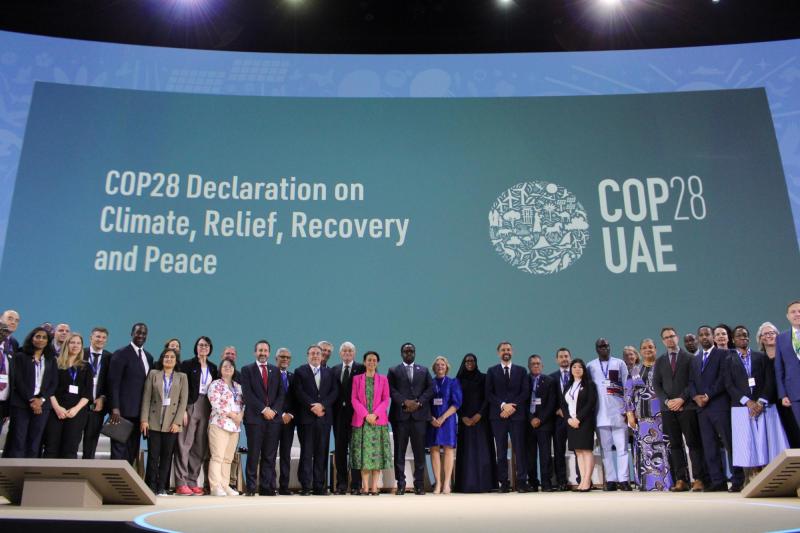
SPARC's work on the conflict-climate change nexus contributed to COP28's Climate, Relief, Recovery and Peace Declaration which was launched on 3 December.
